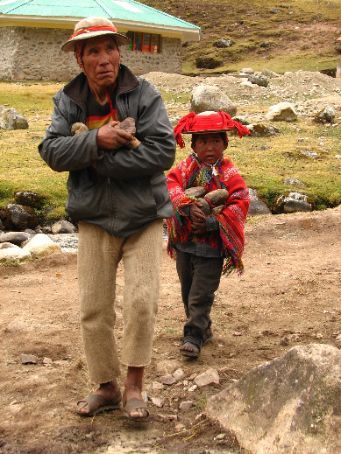Footprints in Peru, Day 8: one stone at a time
PERU | Monday, 20 August 2007 | Views [1695]

Our first mistake is thinking that we’ve come to organize and/or manage; our first lesson is realizing that the locals coordinating this project are professionally skilled and competent, and that the most valuable things we really have to offer are our servitude and sweat.
Having felt heavily burdened by the kindnesses and services that our porters heaped upon us while on the trek, I am greatly relieved by the opportunity to work side-by-side, and ultimately FOR, those that woke us every morning serving tea and morning greetings.
Our group’s tasks consist of two projects: creating a new reservoir and digging the trenches to supply the village with water and building a bridge over one of the rivers so that, during the rain season, people will still be able to travel to and from town and fewer animals will be lost to the swift currents that normally take such annual sacrifices. The bridge project is explained to us as a project needing less brain and more labor and I rush to the side of the party designated to this project mostly because, being a visual person, I want to see something complete and concrete when we finish.
We all file down to the river and ponder the heaps of boulders and stones collected for our purpose. It’s hard for me to envision just how we are going to elevate piles of stones into a traversable arch and I’m busy trying to sort out where to begin when one of the villagers on our work crew walks over to one of the piles of stones, picks one up, walks over to the site of the bridge, and puts it down. Ah. Brilliant. So that’s where we start…
One stone at a time.
And so that is what we do. We form chains to move them more efficiently. And we organize crews to search for specifically sized stones. Some people dedicate themselves to laying stones, while others to carrying or sorting. But the theme is consistently simple: one stone at a time. And that is the best way I can describe how our bridge begins and continues its slow construction.
Since Incan times, it has been a tradition of Andean peoples to organize communal work parties to harvest crops or build irrigation canals and terraces. These parties are called faenas and I find this community spirit especially well-illustrated by the picture of an 80-year old man and his 4-year old grandson, both, with equal vigor and enthusiasm, hauling rocks and handing them to us. In fact, if there is any one memory that captures my time in Peru in a single snapshot, it is the sight of these two people, and the multiple generations between them, united without hesitation in this timeless tradition of what Andeans call, llank’ay, or “the spirit of ceremonial work.”
And even for me, an extranjera, there is a certain amount of tetris-like finesse and ceremony to the work. I assume responsibility as one of the stone layers and so it’s my job to decide on the flattest side of the rock and then determine the best fit of its angles so that it snaps into a pretty place within its neighbors. I find it a delightful task and wonder, even, if perhaps others think I am taking too much time to express my creativity and delicate design work with the stones.
Not as delicate or delightful, and certainly less pretty, however, is the chunk of bloody skin dangling from my right ring finger when, in an overextended reach to take a heavy rock from the arms of the 80-year old, I drop the stone -- with my finger still under it. Luckily I have two pairs of gloves to buffer the cut and bitter coldness to numb it.
After attending to the bandaging of my throbbing finger I take a step back and sit on the river bank to watch the work progress. It’s clumsy work, and even more awkward is the mix of dark-skinned locals in traditional striped costume and pale-skinned foreigners in odd and unnatural block colors. I decide that we, like the cluttered pile of odd-sized stones, are a funny bunch to envision functioning efficiently together. But somehow, something seems to be forming. Slowly but cohesively, as a group, we begin taking on a solid shape together -- one stone at a time.
Tags: culture, footprints, peru